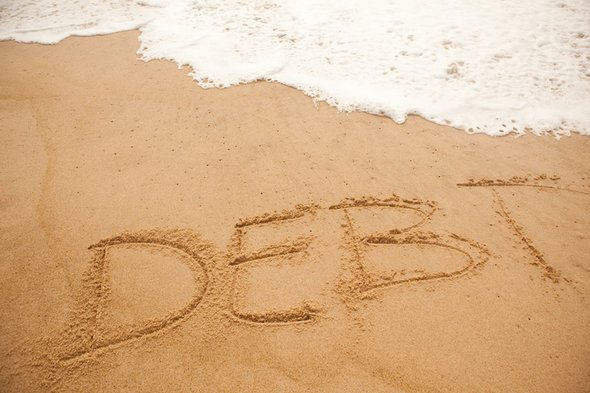No matter how hard you try to keep your debt under control, sometimes it piles up. Depending on your situation, you may be able to cancel some of your debt. That would probably lift a huge weight off your shoulders. But even if your creditor lets you ditch some of your debt, there might be a catch. In some cases, canceled debt can increase your tax bill.
A financial advisor can help you answer questions about debt cancelation and optimize your financial plan to manage debt.
Check out our credit card calculator.
How Is Canceled Debt Taxable?
If your creditor cancels some of your debt, the IRS may count it as income. Why? Let’s look at an example.
Let’s say you have $3,500 in credit card debt but can only afford to pay back $3,000. If your creditor cancels the rest of your debt, you won’t have to pay back the $500 you owe. So when you think about it, you’re essentially $500 richer. That’s why canceled debt is often considered an income gain.
Paying more in taxes because you can’t pay off your debt may seem unfair. But without some consequences for delinquent borrowers, it would be too easy to borrow money and not pay it back.
What Kind of Canceled Debt Is Taxable?

In most cases, canceled debt is taxable. Your debt may be canceled if your creditor stops trying to collect the money you owe. If it’s discharged through a bankruptcy, it may be considered taxable income.
A modification of your mortgage loan may be considered a taxable cancellation of debt as well. If you face foreclosure or your property is repossessed or abandoned, the IRS may consider the cancellation of your mortgage debt to be the equivalent of a home sale. If that happens, you may end up with a taxable capital gain or loss.
Forgiven debt can be taxable, too. Even if you were paying your student loans through an income-driven repayment plan, your forgiven debt may be subject to taxation. One exception to that rule is student debt forgiven through the Public Service Loan Forgiveness Program or a similar initiative.
Cancellation of Debt Income Exceptions
Luckily, there are other exceptions to the IRS guidelines regarding canceled, forgiven and discharged debt. If you’re buying a property and the seller offers a purchase price reduction, the amount you don’t have to pay isn’t considered cancellation of debt income (and therefore doesn’t need to be included on your tax return). The same rule applies if you’re relieved of your obligation to pay back gifts and inheritances or your accountant agrees to cancel debt that would have otherwise been a deductible expense.
If your principal mortgage balance is lowered because the government makes payments on your behalf, those incentive payments aren’t considered cancellation of debt income. This may happen if you’re part of the Home Affordable Modification Program.
Cancellation of Debt Income Exclusions
Cancellation of debt income isn’t subject to taxation if it’s excluded from your gross income. Any debt that’s discharged in a Title 11 bankruptcy isn’t included in your gross income. That exclusion applies to debt canceled during insolvency, too. Insolvency occurs when your debt is forgiven because you have more liabilities than assets.
You may also qualify for an exclusion following the cancellation of your farm debt or real property business debt. If you qualify for mortgage debt relief, your forgiven debt can be excluded from taxable income as well. Just keep in mind that you may need to file Form 982 along with your tax return.
How Do I Report Canceled Debt to the IRS?

After your creditor cancels your debt, you may have to report it to the IRS. You would include it with your tax return following the year the cancellation occurred. When at least $600 in debt is canceled, your collector will send you IRS Form 1099-C. The form will state the amount of debt that the collector canceled. That is the amount you must report to the IRS on your tax return. If you think the information is incorrect, be sure to contact your creditor.
When you receive Form 1099-C, it’s best not to ignore it. Your debt collector will send a copy of the form to the IRS as well. So they’ll expect your tax return to include the canceled debt amount. Failure to report the canceled debt could result in a tax bill or an audit.
Even if you don’t receive Form 1099-C, you’ll still need to report your canceled debt to the IRS. If you’ve received a 1099-C form and your creditor is still trying to collect your unpaid debt, it may not have been canceled.
Bottom Line
Debt cancellation may sound great. But your tax liability often increases when your debt’s canceled. If you’re unsure whether your canceled debt qualifies for an exception or exclusion from taxation, it’s best to see a tax professional. That way, you can avoid mistakes that may result in a tax penalty.
Tax Planning Tips
- If you need tax planning help, don’t hesitate to enlist the help of a financial advisor or another type of financial professional. Finding a financial advisor doesn’t have to be hard. SmartAsset’s free tool matches you with up to three vetted financial advisors who serve your area, and you can interview your advisor matches at no cost to decide which one is right for you. If you’re ready to find an advisor who can help you achieve your financial goals, get started now.
- It you’re expecting a tax refund, having a plan can increase the chances that you’ll put it to good use. Here are five smart ways to invest your tax refund in 2023.
Photo credit: ©iStock.com/Pawel Gaul, ©iStock.com/AndreyPopov, ©iStock.com/elenaleonova
